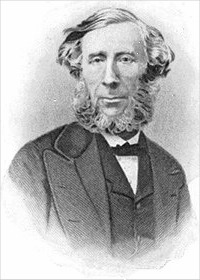 John Tyndall was born in Ireland as the son of a local constable. Tyndall attended
a common primary school and joined the Irish Ordance Survey in 1839. Later he
did surveying work in England and worked later worked on railway construction
in the boom of the 1840s. In 1847 he began to teach mathematics at Queenwood
College Hampshire. In 1848 Tyndall went to study in Germany where he was one
of the first British subjects to receive the new PhD at Marburg. His years in
Germany while still a young man turned Tyndall into something of a naturphilosophisch
romantic pantheist. Tyndall's major scientific work was in atmospheric gases.
He also made many useful inventions. In the 1850s he succeeded Faraday in giving
popular science lectures at the Royal Institution in London where Tyndall became
a lecturer in physics. Tyndall became one of the leading figures in Victorian
science; he was a member of the famous X Club along with other notables like
T.H. Huxley and Herbert Spencer.
John Tyndall was born in Ireland as the son of a local constable. Tyndall attended
a common primary school and joined the Irish Ordance Survey in 1839. Later he
did surveying work in England and worked later worked on railway construction
in the boom of the 1840s. In 1847 he began to teach mathematics at Queenwood
College Hampshire. In 1848 Tyndall went to study in Germany where he was one
of the first British subjects to receive the new PhD at Marburg. His years in
Germany while still a young man turned Tyndall into something of a naturphilosophisch
romantic pantheist. Tyndall's major scientific work was in atmospheric gases.
He also made many useful inventions. In the 1850s he succeeded Faraday in giving
popular science lectures at the Royal Institution in London where Tyndall became
a lecturer in physics. Tyndall became one of the leading figures in Victorian
science; he was a member of the famous X Club along with other notables like
T.H. Huxley and Herbert Spencer.
Tyndall on science and religion
In 1874 Tyndall gave his famous Belfast Address (text) before the annual meeting of the British Association for the Advancement of Science. It was one of the most prestigious places from which to pronounce on what men of science should be doing. Tyndall famously used his address to argue for the superior authority of science over religious or non-rationalist explanations. By the time of this address the Association had largely been taken over by the young guard, men like T.H. Huxley and Tyndall. Nevertheless, Tyndall's bold statement for rationalism and natural law was made in Belfast, a stronghold of religious belief then as now and so it was taken as an aggressive attack on religion. The address was popularly believed to advocate materialism as the true philosophy of science. It remains a powerful call for rationalism, consistency, and scepticism.
Related Material
- Professor Tyndall Lectures at the Royal Institution (1870 Illustrated London News)
- Tyndall and the germ theory of disease
- The Belfast Address, 1874
Texts by Tyndall (not on The Victorian Web)
- Fragments of science for unscientific people: a series of detached essays, lectures, and reviews (1871)
- Sound: being a course of eight lectures delivered at the Royal institution of Great Britain (1867)
- Hours of Exercise in the Alps (1871)
- Six Lectures on Light: Delivered in America, 1872-1873 (1878)
- "On Heat as a Germicide when Discontinuously Applied." Proceedings of Royal Society 25 (1876).
- Les Microbes Organises. Leur role dans la fermentation, la putrefaction et la contagion. Memories de MM. Tyndall et Pasteur. Paris: Libraire des Mondes, 1878.
- "The optical deportment of the atmosphere in relation to the phenomena of putrefaction and infection." Philosophical Transactions of the Royal Society 166 (31 December 1876): 27-74.
Bibliography
Burchfield, J. A. "John Tyndall - a biographical sketch." In William H. Brock, ed., John Tyndall, Essays on a Natural Philosopher. Dublin: Royal Dublin Society, 1981.
Helmstadter, Richard J. and Bernard Lightman, eds. Victorian Faith in Crisis: Essays on Continuity and Change in Nineteenth-Century Religious Belief. London: Macmillan, 1990.
Lightman, Bernard. The Origins of Agnosticism: Victorian Unbelief and the Limits of Knowledge. Baltimore: Johns Hopkins University Press, 1987.
Created 2000
Last modified 30 July 2023